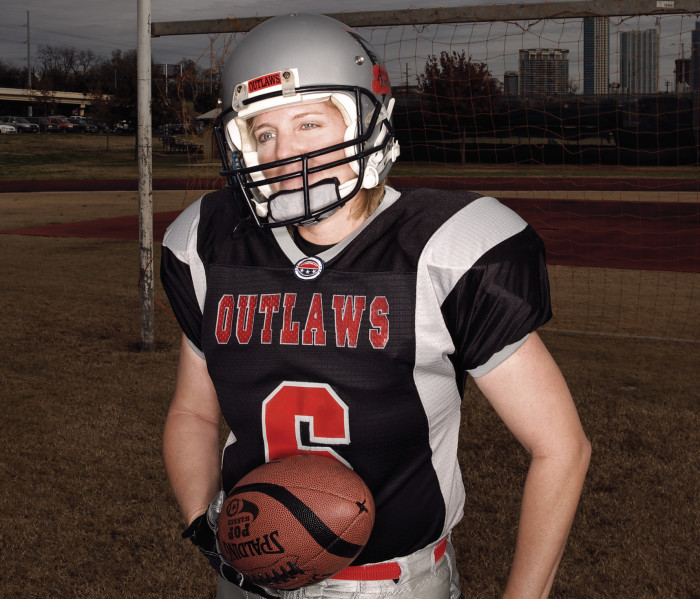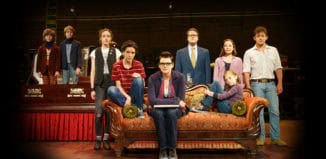The din of a fanatic crowd. The smell of dirt clots unearthed by bulldozing cleats. An air of intense excitement and anxiety. The crunch of helmet colliding with helmet. It’s the great American pastime that dates back to the 1800s, stirs up emotional fervor among players and fans, and pits families and friends head to head as they root faithfully for their favorite teams. This is tackle football, the grueling, no-holds-barred contact sport many young American boys grow up learning, practicing and dreaming about conquering – complete with a multi-million-dollar salary – in the national football league. Full-contact football is not, however, a game for ladies. But don’t tell that to the Austin Outlaws, the city’s only all-female, full-contact football team.
Members of the Women’s Football Alliance (a national organization consisting of more than 40 teams), the Outlaws hosted their first tryouts in the summer of 2000, with hundreds of female athletes showing up to show off their stuff. The first season kicked off in 2001, and players didn’t hold back, their kicking, passing, running and tackling moves just as impressive as any you’ve seen in traditional men’s football. But this is no girly, dumbed-down version of the sport where players pull their punches or lightly tap each other to indicate a tackle. The Austin Outlaws, and every team in the WFA, play by all-pro NFL rules. Players practice between three and five times a week, and the regular season runs from April to June with four home and four away games on Saturday nights. Then playoffs begin, and the season culminates with a much-anticipated national championship game. (Last year, the Outlaws were 7-1 in the regular season.)
Though there are a few variations (the football used is slightly smaller and the semi-professional league is all-volunteer, for instance), this is the same arduous, backbreaking sport men have been playing for more than a century. Indeed, many Outlaw players have sustained broken bones, sprains and torn ligaments, and every player usually finishes a game with her fair share of bruises and scrapes.
“There is nothing like this game,” says Melissa Griffith, a five- year veteran of the Outlaws who’s known to her teammates simply as “Griff.” “It’s unlike any sport I’ve ever played. It’s such a challenge and something I personally never thought I could do. But this team is about more than just the sport; there’s a lot of camaraderie and family within the Outlaws.”
Entering its 10th year, the Austin Outlaws football club (www. Austinoutlaws.com) is comprised of women from all backgrounds, and different races and sexual orientations. There are lesbians and straight women, single and married players, lawyers, doctors, students and even a grandmother or two. And the team is always evolving and searching for new players. In fact, Griffith, a video producer for Austin Community College, encourages any woman 18 or older interested in playing with the Outlaws to try out.
Many women who do try out, and even those who make the team, are often unsure what to expect. After all, women have not had the same type of football training afforded to men since childhood. But, as Griffith explains, it’s really all about having the drive and some athletic ability. The rest can be taught by the coaching staff and other tenured players.
For Griffith, whose previous sports experience included tennis, golf, ballet, softball and soccer, kicking and punting were an obvious fit.
“My no. 1 love is punting. I’m not the biggest, strongest or fastest player, but I have a good foot. Initially, I wanted nothing to do with tackling, and the first few seasons I didn’t even wear any pads except shoulder pads,” she says, still amazed by that fact.
Since then, Griffith has challenged herself to step it up and play outside of her comfort zone. She’s played as a cornerback, punter and specialty kicker, and this year hopes to land the position of safety. She’s also learned to embrace the idea of tackling.
“I’ve never been much of a hitter, and i don’t want to hurt anyone when i hit them,” Griffith says. “But if you don’t go into the game giving it your all, there’s a chance you’re going to get hurt yourself. So there’s something to be said for hitting first and hitting hard.”
Though last year was going to be Griffith’s last with the Outlaws, a bitter loss to Jacksonville in the first round of the playoffs, combined with encouragement from her fellow teammates, led her to commit to another year with the team – the ultimate goal being to conquer the national championship game. But, Griffith admits even when she’s no longer a player, she still plans to be involved, perhaps in a coaching or supportive capacity. After all, the team motto is “once and Outlaw, always an Outlaw.”
While the hard-hitting football activity involved for Outlaws players is challenging enough, team members are also charged with raising their own funds, a daunting task that can be just as exhausting and time-consuming. Because the Outlaws have no major backer, much of the $2,800 per game needed for field rental, the officiating crew, concessions, insurance, travel, EMS services and equipment can be tough to amass from attendance fees alone. So the team is always looking for bigger sponsors to help foot the enormous $50,000 bill for the season. Of course, any sponsorship helps, Griffith says, and ensures the longevity of the local football club.
As for how Griffith sees the sport of women’s full-contact football growing, she’s hopeful but also realistic.
“I think football will always be seen as a man’s sport. There are some people who don’t want to see women playing football, and that’s too bad for them,” she says. “I can only hope that one day we’ll get girls’ football programs at the grade-school level, and then maybe it will grow from there. And then, wow, think of what kind of modern women’s league we’ll have when little girls are afforded the same opportunities as little boys and actually grow up learning how to play football!”





































